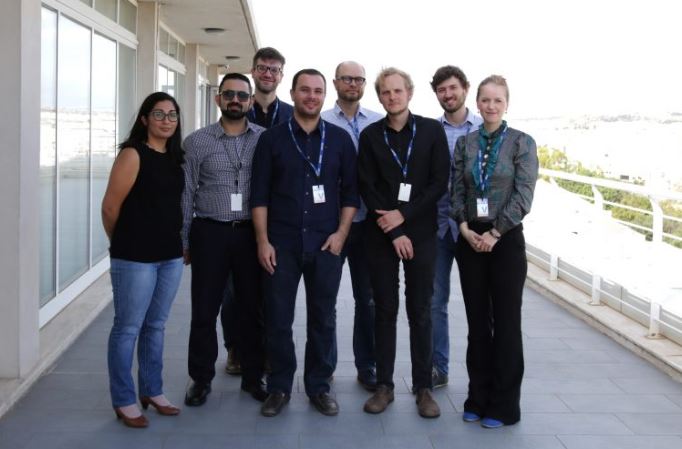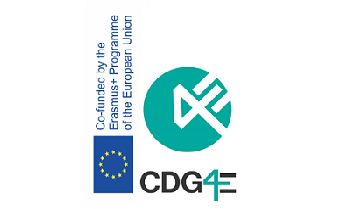
Let’s create games for education!
The ERASMUS+ project ‘Create Digital Games for Education’
Digital games are an integral part of most of our students’ life outside the classroom. Throughout the years, games have been increasingly recognised as powerful learning tools to facilitate students’ learning. Most notably, games allow students to be at the centre of the learning experience, allow room for trial and error and make learning fun and engaging. This Strategic Partnership proposes targeted efforts that challenge traditional pedagogies and encourage the use of innovative game-based learning (GBL) methodologies for learning purposes. The Erasmus Plus Strategic partnership is proposing a Game Creator Tool (GCT) (that will run on a range of devices), developed for ease of use in classrooms to help enrich the educational and skills portfolios of local and European educators. This partnership will further promote synergies, sharing of best practices, cooperation and cross-fertilisation between the fields of technology and education.
The impact of this partnership is aimed at bridging the gap between the complex world of programming and designing games with the availability of an open and easy-to-use tool for game authoring. The project outputs are meant to throw light on the need for further research into the positive potential of actively designing games for learning purposes, enhance the digital competences of students with particular focus on media literacy and STEM education via GBL learning.
A synergistic working relationship will be created between European partners from Malta, Austria, Germany and Luxembourg that will strengthen cooperation between organisations, post-secondary schools and also facilitate the exchange, testing and development of best practices in the field of education. The team will work together towards the development of a user-centered game-based learning framework. The GCT will allow students and teachers to work on game projects to dive deeper into the subjects of Fake News and STEM. The Fake News Game will serve as one of the pilot demonstrators for the Game Creator Tool. This will allow both teachers and students to create their own games related to the subject. Based on the current impact of fake news across social media and news portals, it is essential that the general public, in particular youth learn how to identify reliable news sources. On the other hand, the STEM pilot game will be based on and inspired from a current theme in the education STEM syllabi currently being adopted in Malta at post-secondary level of schooling. The game will serve as a precursor to and underpinned by an inquiry-based learning approach, where students will practice both STEM-related process skills and critical thinking skills.
A total of 7 multiplier events, 3 transnational partner meetings and 1 joint training staff event are planned for this three-year project. All of these events will involve various participants and entities from the European Union and will increase awareness of the project and its goals. Results of the meetings and training events, as well as project progress, will be disseminated online.
It is envisaged that following project closure, the lessons learnt and the outputs emanating from the project, will continue to be disseminated throughout Europe. Project results will be collated and an analysis will be conducted in order to formulate a best practices recommendations document. The results will be then made available online for public download. The intention of this is to amplify the project’s aims by reaching out to decision makers on curricula and hold dialogue with them on GBL as a powerful learning methodology.

The Partnership aims to enhance the level and quality of digital competences and relevance of students’ knowledge and skills and promote students’ centered learning approaches through ICTs. Through this project, the consortium will seek to create an innovative method of teaching as well as learning. ICTs will be used effectively to enable educators to diversify their pedagogies and enable students to learn using a tool that is modern and attractive, thus motivating students’ appetite to learn.
This Strategic Partnership involves the appropriate mix of complementary project partners with the necessary profile, experience and expertise to deliver successfully all aspects of the project. The consortium consists of a team of academics, researchers, education consultants, and ICT experts. MITA together with the Ministry of Education in Malta will work together to bring a number of post-secondary schools to help us test the GCT and the pilot games accordingly. Independently of this, MITA has a very good business relationship with most post-secondary educational institutions. The commitments and tasks have been distributed diligently and responsibly to successfully produce high quality innovative deliverables.
Please also visit following page: MITA Project Page
A funded project
This project has received funding from the European Union’s ERASMUS+ programme under grant agreement 2017-1-MT01-KA201-026955 (Key Action 2: Strategic Partnerships). The European Commission support for the production of this material does not constitute an endorsement of the contents which reflects the views only of the authors, and the Commission cannot be held responsible for any use which may be made of the information contained therein. The European Commission support for the production of this publication does not constitute an endorsement of the contents which reflects the views only of the authors, and the Commission cannot be held responsible for any use which may be made of the information contained therein.

The project partners






